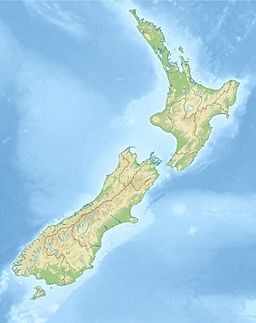Abel Lake facts for kids
Quick facts for kids Abel Lake |
|
|---|---|
| Location | South Island |
| Coordinates | 43°20′28″S 170°38′18″E / 43.3410°S 170.6383°E |
| Type | Proglacial lake |
| Primary inflows | Abel Glacier |
| Basin countries | New Zealand |
| Surface area | 6.6 hectares (16 acres) |
| Surface elevation | 968 metres (3,176 ft) |
Abel Lake was a small lake that used to exist in the Westland area of the South Island of New Zealand. It was located high up in the Southern Alps, about 35 kilometres (22 mi) east of a town called Franz Josef. The lake got its water from the nearby Abel Glacier. A short stream flowed out of Abel Lake and connected it to the Perth River. By May 2017, the lake was likely gone. It might have filled up with rocks and dirt carried by glaciers, or its outlet stream might have changed naturally or been altered by people looking for gold.
Contents
What Was Abel Lake?
Abel Lake was a special type of lake known as a proglacial lake. This means it was formed by a glacier. Glaciers are like giant, slow-moving rivers of ice. As a glacier moves, it carves out the land, creating hollows or depressions. When the glacier melts, water fills these hollows, forming a proglacial lake.
Where Was It Located?
Abel Lake was found in the Southern Alps, a huge mountain range that runs along the South Island of New Zealand. This area is famous for its stunning natural beauty, including many glaciers and lakes. The lake was part of the Westland District, a region known for its rugged mountains, dense forests, and wild coastlines.
How Did It Get Water?
The main source of water for Abel Lake was the Abel Glacier. Glaciers are always slowly melting, especially at their lower ends. This meltwater would flow directly into Abel Lake, keeping it full. The lake also had a short stream that carried water away from it, eventually joining the Perth River.
Why Did Abel Lake Disappear?
Lakes formed by glaciers can sometimes be temporary. Abel Lake was likely a good example of this. By 2017, it was believed to have disappeared.
Natural Changes
One reason for its disappearance could be natural changes. Glaciers are constantly moving and changing the landscape.
- Alluvial and Glacial Rock: Over time, glaciers can carry huge amounts of rock, sand, and mud. This material, called "alluvial" or "glacial" rock, can build up and fill in lakes. It's like a giant natural bulldozer pushing dirt into a hole.
- Erosion: The outlet stream of a lake can also change due to natural erosion. If the stream that flows out of a lake cuts deeper, it can drain the lake over time.
Human Activity
Another possible reason for Abel Lake's disappearance involves human activity, specifically from the time of the West Coast Gold Rush.
- Gold Prospectors: During the 1860s, many people came to the West Coast of New Zealand looking for gold. These gold prospectors often used water to help them find gold. They might have dug channels or altered streams to control water flow for their mining activities. It's possible that some gold prospectors changed the outlet of Abel Lake, causing it to drain away.
The West Coast Gold Rush
The West Coast Gold Rush was a very exciting time in New Zealand's history, starting around 1864. Thousands of people, called prospectors, flocked to the West Coast hoping to find their fortune in gold.
Finding Gold
Prospectors would search for gold in rivers and streams, often using tools like pans and sluice boxes. They would dig up gravel and wash it, hoping to find shiny gold flakes or nuggets. This work was very hard and often done in remote, difficult areas like the mountains where Abel Lake was located.
Impact on the Land
The gold rush had a big impact on the environment. Prospectors sometimes changed the landscape by digging, diverting rivers, and building small dams. While they were looking for gold, they might have accidentally or intentionally altered the natural flow of water, which could have affected lakes like Abel Lake.
 | Kyle Baker |
 | Joseph Yoakum |
 | Laura Wheeler Waring |
 | Henry Ossawa Tanner |


